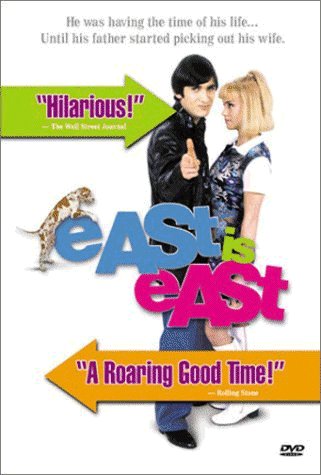
EAST IS EAST
UK, 1999, 92 minutes, Colour.
Om Puri, Linda Bassett, Jimi Mistri, Jordan Routledge.
Directed by Declan O' Donnell.
East is still east in Salford, 1971, but this film dramatises, often comically, how east has to deal with west - and vice versa.
Om Puri is a patriarchal, sometimes tyrannical, Muslim Pakistani, married to Catholic, Linda Bassett, and with seven children. And there are the gaps: racial, cultural, social, religious, let alone generational.
Filmed naturalistically in Northern England, the film invites its audiences to share the family's struggles, difficult as we move from liking to dislike and back again.
The screenplay - by a British Pakistani playwright and directed by an empathetic Irishman, Declan O' Donnell, raises many universal family issues quite tellingly. A good deal of earthy language and situations mean that the film is well worth seeing and is provocative for its audiences. The film won the BAFTA award for best British film for 1999 (as well as an OCIC award at the Buenos Aires film festival).
1.The impact of the film? Comic, serious? For the UK audience? For the mixed race audiences? Beyond the UK? The title and its meaning - overtones of Rudyard Kipling in the UK of the late 20th century?
2.The 1971 settings? The background of Enoch Powell and his comments on migration? Demonstrations against migrants? The fight about the establishment of East Pakistan as Bangladesh? The issues in the UK in the early '70s, social, cultural, religious? The next generation of migrants settling into England and becoming English?
3.The background of the writer, his own family experiences, his empathy with his background? The film originally as a play - opened up for the screen?
4.Racial issues in the UK - in the '70s as well as later and the time of the release of the film? The role of Muslims in and around Salford as well as in Yorkshire and Bradford?
5.The opening of the film with the highlighting of Catholic and Muslim traditions? The father and his proud Muslim tradition, the mother and her wanting her children to have some Catholic background? The procession through the streets of Salford and having to elude the father seeing them?
6.The film's focus on family and the functioning of family? The role of the patriarchal father? The strong but submissive mother who loves her husband? The range of children and the next generation? The oldest son and the arranged marriage, the next children and their being assimilated, the daughter and her place in English society, the young boy and the next generation?
7.The film dramatising the various gaps within the family and the individuals in English society?
8.The marriage, the symbols, the clothes? The arranged marriage and the rituals? Nazir and his reluctantly going to be married, the ceremonies, the response of the family, his father depending on his son marrying well and buying the various costumes and headdress for the wedding? Nazir and his walking out, his being disowned, the disgrace for the family?
9.The character of George, Om Puri's screen presence? Strong, strict, patriarchal? His manner of speaking, accent, his language and swearing? His treatment of his wife, of the children? The Muslim background and expectations? His coming to England in 1937, getting the role in the movie, establishing himself, leaving his first wife in Pakistan - or in India - and using that as a threat to his second wife? His becoming British in many ways but not assimilating so well? The passing of 25 years, the seven children? The fish and chip shop? His relationship to his wife? To the Muslim community, to the Pakistani tradition, language?
10.The contrast with his wife, married for 25 years, the children? Her love for her husband, yet his brutality? Love for her children and with the difficulties of their growing up? Her friendship with the woman across the street as a kind of relation for the family? The shop, the fish and chips? The consequences of her choices in marrying? Nazir and his not going through with the wedding? Her relationship with her children, the older sons and their working, the daughter and her studies, the student of art, the young boy and his being circumcised - and the humour of the circumcision and the post-circumcision sequences?
11. Nazir, his place in the household, character, deceits, leaving, in the shop, with Nigel? His being gay, the visits, the phone calls?
12.Abdul, the work, sexual issues, the stag party, modest, the disco, the marriage preparations, the final confrontation, Saji and the cap?
13.Tarik, his place in the family, sexual attitudes, Stella, the friend, the chips? The disco, the marriage situation, rebelling, leaving for Nazir, backing down?
14.Sajid, his art, the money, the sculpture?
15.Maneer, her place in the family, following her father and mother, dutiful? The Muslim traditions and her reaction? Packing up, her final decision?
16.Sajid, Ernest, their friendship, the anorak? The circumcision issue, the pissing, the drawing, their talk?
17.Mena, school, the uniform, the dance, Ernest, the background of social comment in 1971? The sari?
18.Stella, her character, Annie, her character? Her influence in the family? The different ethnic backgrounds?
19.Life in the street, Ernest and his grandfather, the film’s attention to detail within the house, outside?
20.The Urdu school? The disco? Bradford and the movies?
21.Negotiation with Shah, Shah’s visit, the rudeness, the dog?
22.The build-up to the climax, the chase?
23.How well did the film blend both the comic and the tragic? A portrait of Britain in the 1970s? The political background of Enoch Powell and his social comment, critiques? Racism? The 1970s seen in the perspective of later decades, integration, multiculturalism, stances towards Pakistanis and Indians, towards Muslims?